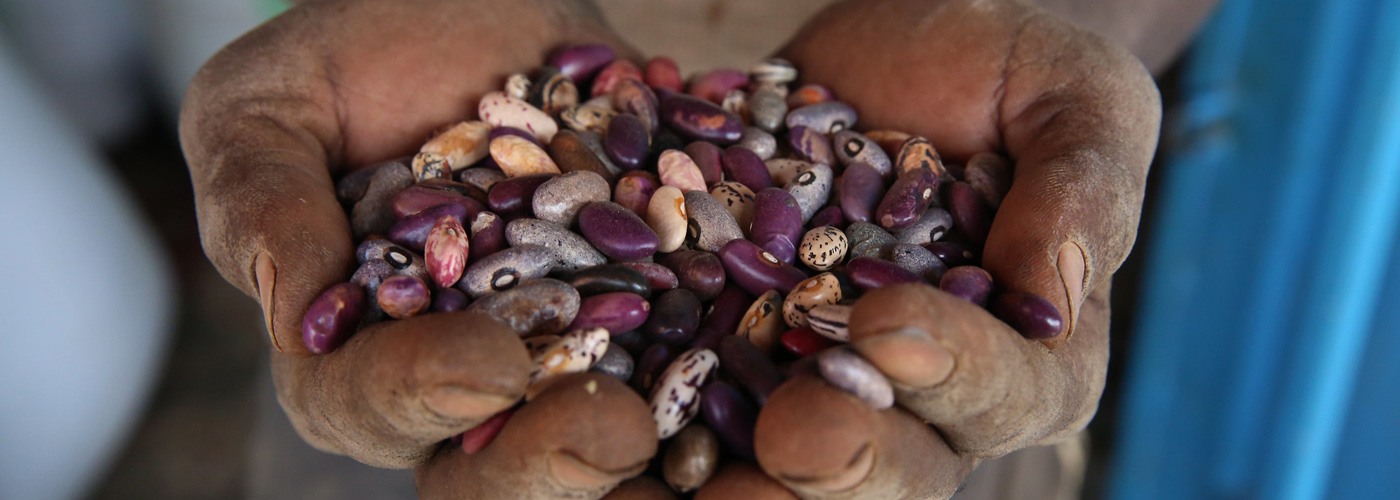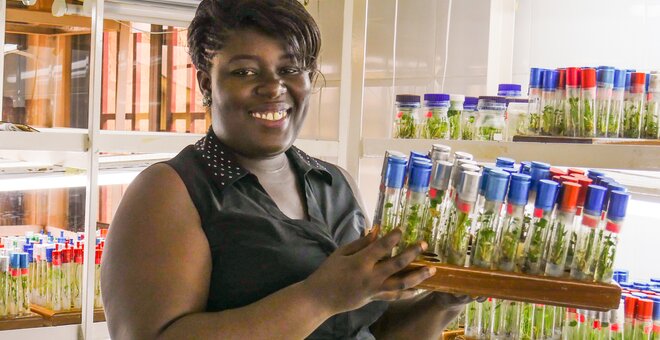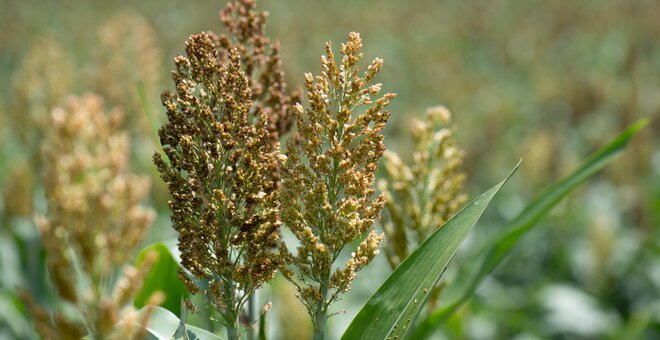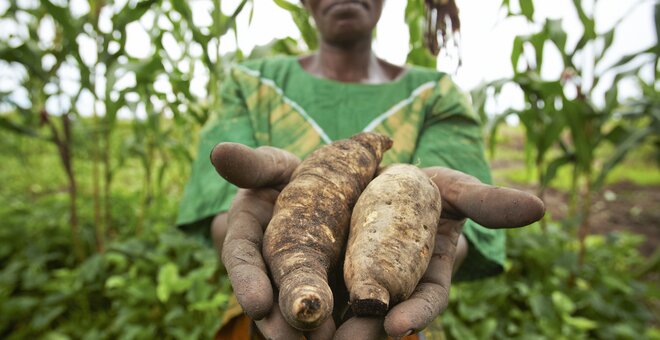Strengthening Genebanks in Africa
Seeds for Resilience is a five-year project supporting collections of key crops identified by partner genebanks in five sub-Saharan African countries: Ethiopia, Ghana, Kenya, Nigeria and Zambia.
The Crop Trust is increasingly looking at how its support can be extended to as many genebanks as possible, in particular national collections. The Seeds for Resilience Project is a key element of this evolution, presenting a new model for the way that the Crop Trust works with such genebanks. A key element of this is strengthening the genebanks’ ties with users in their countries. This will help farmers, plant breeders and others explore the wealth of diversity found in national genebanks and put it to use in creating resilient farming systems.
At A Glance
The Seeds for Resilience Project supports five national genebanks in Africa to conserve, share and use their collections of key crops to build more resilient and diversified food production.
- PROJECT TITLE: National Seed Collections for Climate-Resilient Agriculture in Africa
- HIGHLIGHTS FROM 2021: Agreements signed with five partner genebanks; standard operating procedures developed for conservation and regeneration; procurement of vehicles and laboratory and information technology equipment initiated; initial funds distributed.
- IMPLEMENTING PARTNERS: Ethiopian Biodiversity Institute; the Plant Genetic Resources Research Institute of the Council for Scientific and Industrial Research, Ghana; Genetic Resources Research Institute of the Kenya Agricultural and Livestock Research Organization; the National Center or Genetic Resources and Biotechnology of Nigeria; and the National Plant Genetic Resources Center of the Zambia Agricultural Research Institute.
- FUNDING PARTNER: Government of Germany (BMZ), through the German Development Bank (KfW)
Agreements Signed with Partner Genebanks
2021 was a busy year for the Seed for Resilience project, with agreements signed with all five participating genebanks, allowing the project to make major strides in implementing its program of activities.
Target Crops Selected for Special Support
During 2021, the genebanks identified crops from their collections that are particularly important to farmers in vulnerable rural areas so that they can receive special support under the project.
Target crops:
- Ethiopia: Faba bean, barley, sorghum, enset and coffee
- Kenya: Sorghum, finger millet, pearl millet, cowpea, pigeonpea and mung bean
- Zambia: Beans, cowpea, sweetpotato, cassava and sorghum
- Ghana: Cowpea, maize, rice, Solanum spp. and cassava
- Nigeria: Sorghum, okra, pearl millet, cowpea and yam
Rebuilding Zambia’s Sweetpotato Collection
The rebuilding of Zambia’s sweetpotato collection is a good illustration of how the project is working with the partner genebanks.
The National Plant Genetic Resources Center (NPGRC) of Zambia lost its sweetpotato collection about 10 years ago due to an intense drought and the lack of a functioning irrigation system. But thanks to support from the Seeds for Resilience Project, the genebank has started the process of rebuilding the collection.
In April 2021, a team from NPGRC managed to visit three of Zambia’s 10 provinces and collect 208 seed samples of sweetpotato, this despite the challenges posed by the COVID-19 pandemic.
Building on this work, an agreement was signed between the Crop Trust and the NPGRC under the Seeds for Resilience Project. This will support further work by the genebank, including field evaluation of the sweetpotato collection with the help of local farmers and developing ways to produce duplicates of the samples for backup in other genebanks. It will also see a functioning irrigation system installed in the sweetpotato and cassava field genebank.
Financial and Technical Support Building Strong Foundations in Kenya
Similarly, the project is working with the Genetic Resources Research Institute (GeRRI) in Kenya to build solid foundations for its crop collections. This includes equipment upgrades, technical training and support in implementing a new quality management system.
Moving Ahead
Early in the year, participating genebanks developed standard operating procedures (SOPs) for conservation and regeneration, and work is well advanced on SOPs for characterization.
The project also moved ahead with the next steps to procure vehicles and laboratory and information equipment on behalf of the partner genebanks. Often, the genebanks do not have access to funds to purchase such equipment, which is essential for the efficient management and sharing of the collections. Tenders were launched in the second half of the year.
Work plans and budgets developed by the partners in 2020 were reviewed and approved between May and August 2021 and initial funds were disbursed to support key project activities, such as seed regeneration, digitization of accession-level information and establishment of user groups.
Donor Representatives Visit Kenya Genebank
Two representatives of the German Development Bank (KfW), which manages the German Government’s financial support to the Seeds for Resilience Project, visited GeRRI in September 2021 to gain hands-on understanding of the genebank, its operations and the challenges it faces. The visit gave the bank’s representatives a firsthand view of what the project means to partners on the ground.
Communications Community of Practice Resumes Activities
In 2021, the Communications Community of Practice established by the project carried out a self-assessment of needs, capacities and capabilities. Online capacity-building courses on photography and interviewing were provided. Consultants engaged by the project are working with the genebanks’ communication focal points to identify user groups and prepare work plans.
Audits Conducted
In 2021, Seeds for Resilience launched a tender to identify companies to conduct external audits of partners’ financial procedures and their conformity to KfW’s Compliance Covenants, which cover such aspects as corruption, nepotism and sexual exploitation of women and children. These audits will be conducted in the first half of 2022.
Related news
African Genebanks Move from Strength to Strength
Dr. Janny van Beem, the Crop Trust’s Quality Management Systems expert, uses the image of a staircase to illustrate how quality management is a gradual and continuous process: you build your way up, one step at a time, creating...
13 Jan 2021
13 Jan 2021
Crop Trust Signs Landmark Agreement With Kenya’s National Genebank
As part of its Seeds for Resilience Project, the Crop Trust has signed the first of five major agreements with national genebanks in sub-Saharan Africa with the Kenya Agricultural and Livestock Research Organization (KALRO), which...
15 Jun 2021
15 Jun 2021
The Future Is Indeed Sweet for Sweetpotato Farmers in Zambia
The Crop Trust has signed an agreement with Zambia’s national genebank under the Seeds for Resilience Project to help safeguard the country’s crop diversity and make it more accessible to farmers, breeders and researchers.
The...
12 Jul 2021
12 Jul 2021










